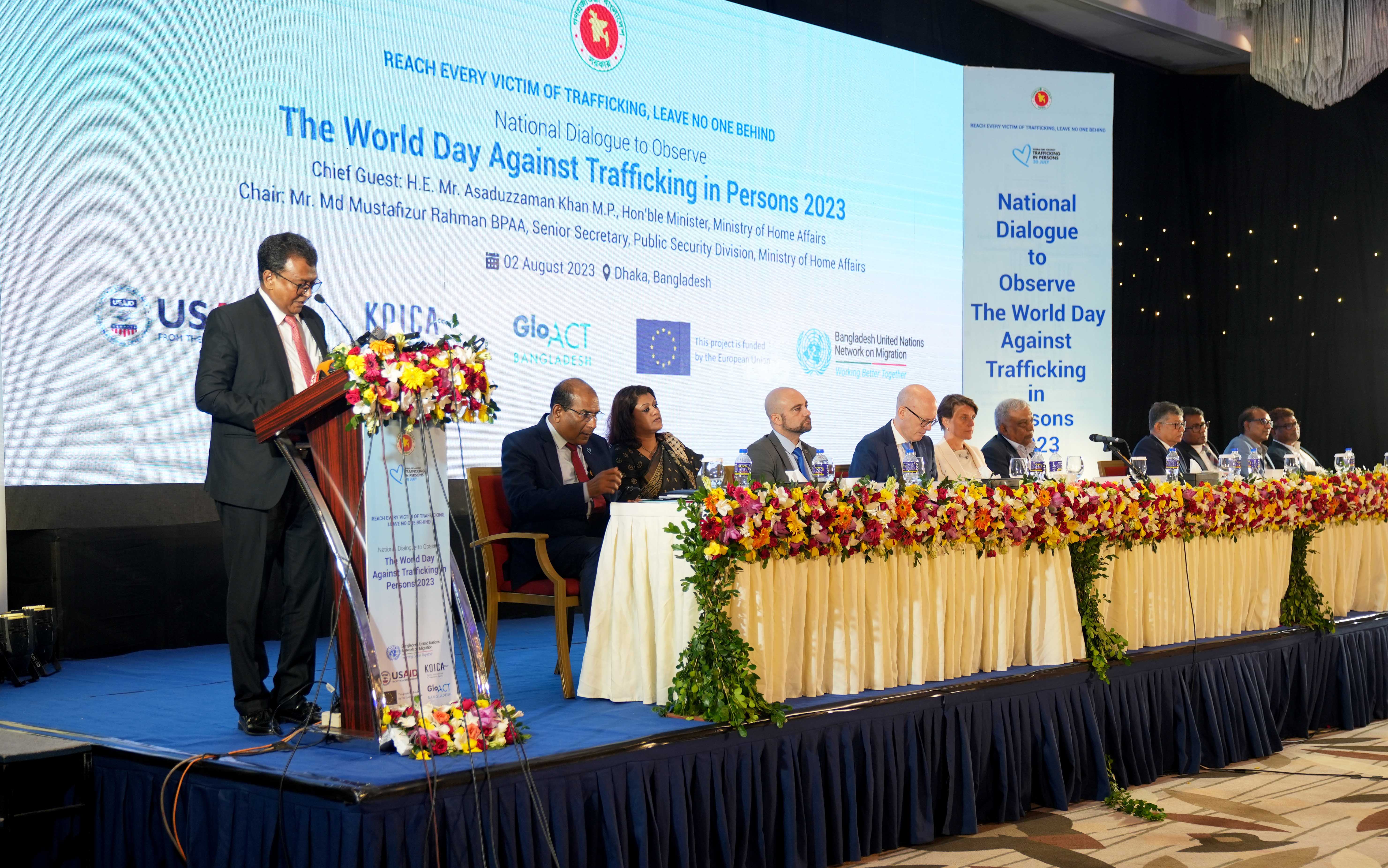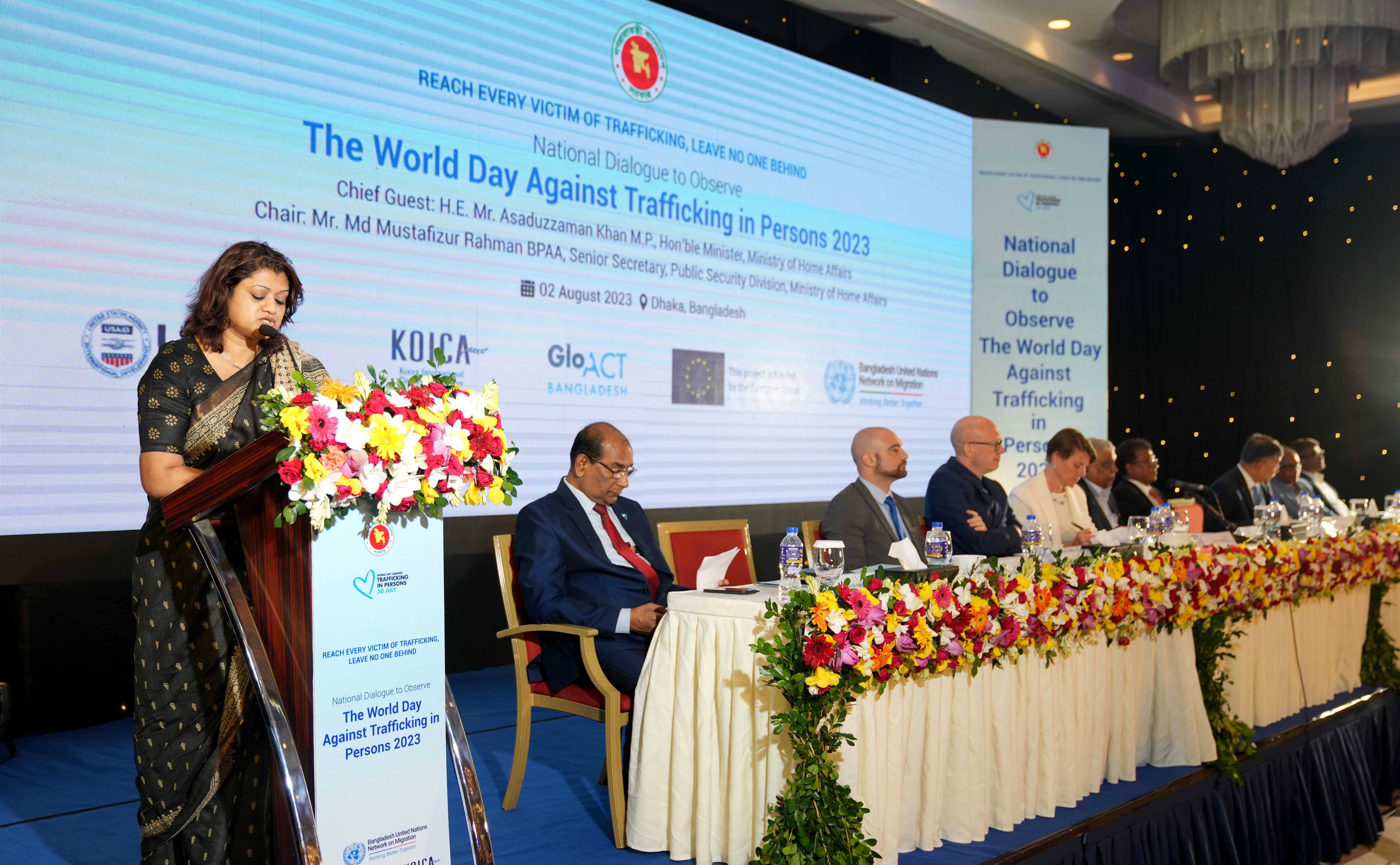-
Who We Are
WHO WE AREIOM is the leading inter-governmental organization promoting humane and orderly migration for the benefit of all, with presence in over 100 countries. IOM has had a presence in Bangladesh since 1998.
About
About
IOM Global
IOM Global
-
Our Work
Our WorkAs the leading inter-governmental organization promoting humane and orderly migration, IOM plays a key role to support the achievement of the 2030 Agenda through different areas of intervention that connect both humanitarian assistance and sustainable development. IOM's objective in Bangladesh is to promote migration that protects and benefits migrants and their societies.
Cross-cutting (Global)
Cross-cutting (Global)
- Data and Resources
- Take Action
- 2030 Agenda
National Dialogue Calls for Collective Action to Combat Trafficking and Uphold Victims' Rights
DHAKA— Trafficking in persons and the smuggling of migrants remain pervasive organized crimes. They are recognized as crimes against humanity and continue to thrive in situations of vulnerability.
Today, on the occasion of the World Day against Trafficking in Persons, Public Security Division of the Ministry of Home Affairs (MoHA) with support from the Counter Trafficking in Persons Technical Working Group (CTIP-TWG) of the Bangladesh UN Network on Migration (BDUNNM), held a national dialogue in Dhaka.
The dialogue, themed "Reach every victim of trafficking, leave no one behind," emphasized the need for a holistic approach to addressing trafficking in persons, committing to comprehensive measures to protect victims and preventing these rights violations.
Addressing the dialogue as the Chief Guest, Asaduzzaman Khan, MP, Minister of Home Affairs said, “We should not only care for rescue, repatriation and rehabilitation but we need to make comprehensive awareness program so that no one becomes victims of trafficking.”

The dialogue was chaired by Md. Mustafizur Rahman, Senior Secretary, Public Security Division, Ministry of Home Affairs who remarked “we are committed to strengthen our National Authority for prevention of Human Trafficking to be more operational and we will work hand to hand with all stakeholders for this”.

Ambassador Masud Bin Momen, Foreign Secretary, in his remarks as special guest, reiterated Bangladesh’s strong commitment and coordinated actions to combat organized crimes including trafficking in persons. He said, “Under the leadership of Her Excellency Sheikh Hasina, consistent efforts are required to address other forms of vulnerability and root causes leading to human trafficking cases. Protection of victims and their welfare are shared responsibility and require sustained attention from all stakeholders.”

Md Abdullah Al Masud Chowdhury, Secretary, Security Services Division remarked, 'To improve the migration process and making it easier, sustainable and time worthy for the Bangladeshi nationals the Immigration and Passport Department has been working relentlessly. We have launched e-Passport with more security features.”
The COVID-19 pandemic has pushed trafficking further underground and increased the dangers to victims by making the crime less likely to come to the attention of the authorities. According to UNODC Global Report on Trafficking in Persons 2022, overall, 41 per cent of victims who manage to escape their ordeal reach out to the authorities on their own initiative, another clear sign that anti-trafficking responses are falling short.
Gwyn Lewis, United Nations Resident Coordinator in Bangladesh stated, “With the support of humanitarian and development partners, I encourage the government to ensure that all survivors of trafficking including Rohingyas have access to national protection services and continue to build capacities of law enforcement agencies and other relevant authorities to identify and refer trafficking victims, while also conducting investigations and ensuring perpetrators are brought to justice.”
"UNODC’s latest Global Report on Trafficking in Persons highlights the need to continue making efforts to detect victims globally and increase the number of convictions in trafficking cases. Together, we must do more to put an end to this heinous crime, support survivors, and prosecute traffickers.” said Marco Teixeira, UNODC’s Regional Representative of South Asia.
Fathima Nusrath Ghazzali, Acting Coordinator, BDUNNM and Officer in Charge, IOM Bangladesh remarked, “Human trafficking is a horrendous crime and in times of crisis susceptibility to trafficking increases, especially for the most vulnerable. We have seen this since 2020 as the world responded to the COVID-19 pandemic. We need to redouble our outreach efforts and ensure support for every victim of trafficking.”

Mr. Md. Khairul Alam Shiekh, Additional Secretary (Political & ICT), Public Security Division, Ministry of Home Affairs; Mr. Mir Khairul Alam, Additional Secretary, Ministry of Expatriates’ Welfare and Overseas Employmen; Mr. Md. Monirul Islam, bpm (bar), ppm (bar), Additional Inspector General of Police, Special Branch, Bangladesh Police; H.E. Charles Whiteley, Ambassador and Head of Delegation, the Delegation of the European Union to Bangladesh; Ishita Rony, Deputy Secretary, Public Security Division of MoHA;; Mahdy Hassan, National Programme Coordinator, UNODC; and Chair, CTIP-TWG; Ms. Susan Stamper, Chief of Party, USAID’s Fight Slavery and Trafficking-In-Persons (FSTIP) Activity, Winrock International also participated in the discussion.
The national Dialogue reflected Bangladesh's commitment to tackling the complex issues related to trafficking in persons and smuggling of migrants, while putting in place comprehensive measures for the protection and support to victims.
The "Global Action against Trafficking in Persons and the Smuggling of Migrants in Bangladesh (GLO.ACT-Bangladesh)" project funded by the European Union and implemented by the Public Security Division in partnership with UNODC and IOM; the "Comprehensive Counter Trafficking Programme to Address Human Trafficking in Bangladesh" project funded by KOICA and implemented by the Public Security Division in partnership with IOM; the "Fight Slavery and Trafficking in Persons (FSTIP) Activity" funded by USAID and implemented by Winrock International; UNHCR; BRAC; and Justice & Care provided financial support to organize the dialogue.
For further communication, please contact:
01. Md. Sharif Mahmud Apu, Email : pro2min@mhapsd.gov.bd, Tel : +880 1710635348
02. Md. Sariful Islam, Email : mdsislam@iom.int, Tel : +880 1915631608
About World Day Against Trafficking in Persons:
July 30 each year is marked globally as the World Day against Trafficking in Persons, proclaimed by the United Nations General Assembly. This is a day dedicated to raising awareness of human trafficking and promoting and protecting the rights of its victims.
Analysis
